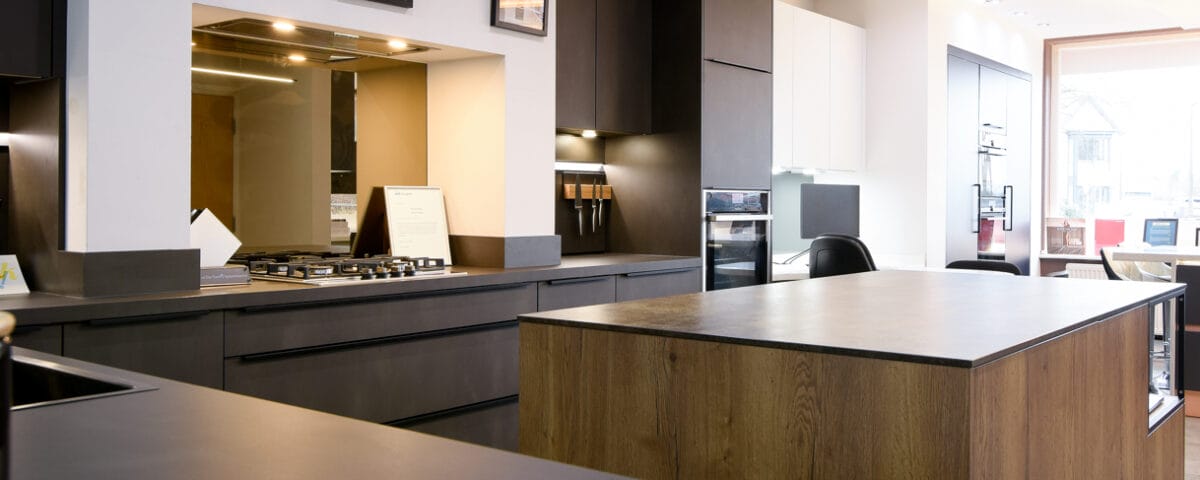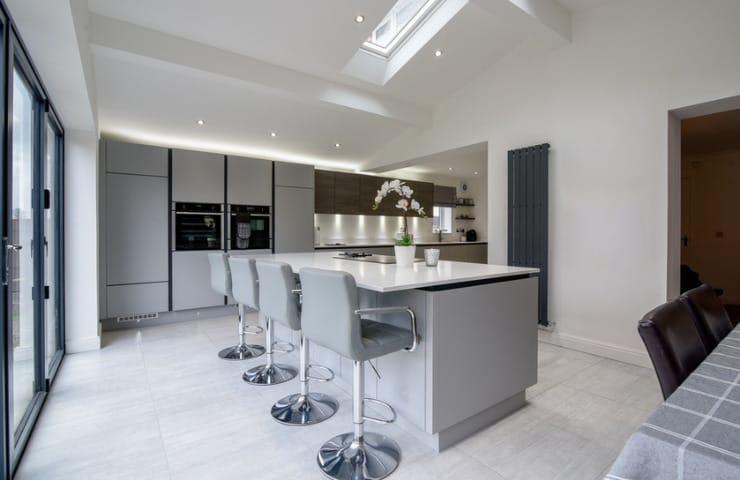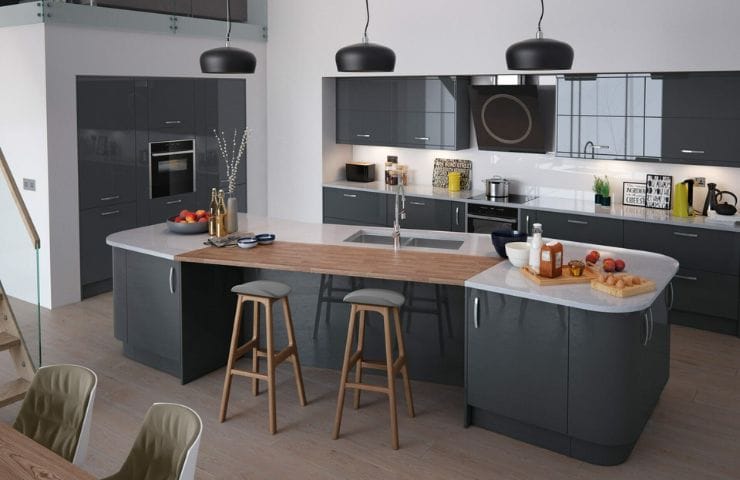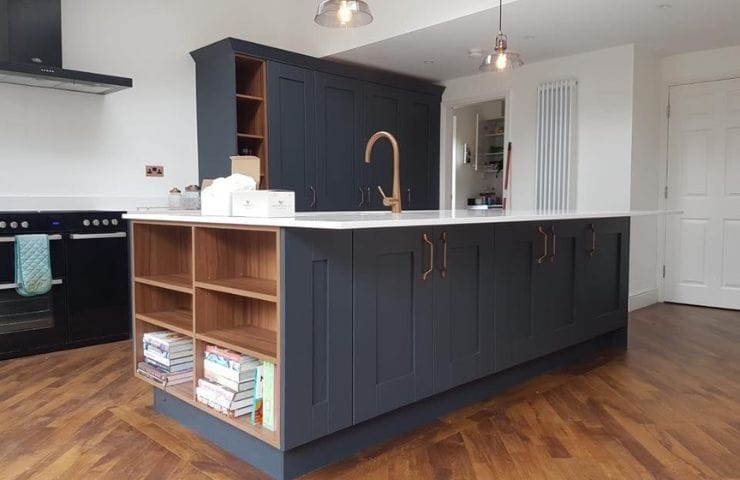Choosing the right kitchen worktop material is essential. As well as impacting the look of your new interior, your decision will dramatically affect the practicality and longevity of your space. Your worktops will potentially be exposed to food spills, water, scratches, and hot pans on a daily basis, so you’ll need to select a material that works with your lifestyle. However, it’s not as simple as just choosing the most durable solution. Which kitchen worktop is right for you will depend on a range of factors, including your budget, the level of durability you require, and your personal taste. Below we’ve put together a guide to some of the most popular kitchen worktop materials to help you weigh up your options.
Laminate Kitchens Worktops
Laminate worktops are affordable, quick to install, and low maintenance. They are scratch and stain-resistant and easy to clean with detergent and a damp cloth. Comprised of a chipboard core and bonded melamine coating, they come in a huge variety of colours and patterns, ranging from elegant wood to chic stone-effect.
Unfortunately, they are not as heat-resistant as some materials and can be particularly susceptible to water damage around joins. You will therefore need to install an inset sink. And, while quality laminates are fairly convincing, they won’t look or feel quite as luxurious as real wood or stone.
Compact or high-pressure laminates (HPLs) are like traditional laminate worktops but without the chipboard core. Doing away with the chipboard centre gives them much better water resistance and makes it easier to hide any joins. Compact laminates also make a good choice if you’re looking for a sleeker, more modern finish, as they are available in thinner 12mm sheets. Compact laminate is more expensive than standard laminate but not as expensive as quartz or solid surface materials.

Timber Worktops
Prized for its warm, tactile finish, wood is a lovely material to incorporate into your kitchen design. Whether you’re hoping to add character to a contemporary interior or accentuate the homely qualities of your classic country kitchen, timber worktops make a lovely choice.
Different types of wood, such as oak, beech, bamboo, walnut, and iroko, all have a unique colour and grain, allowing you to put the perfect finishing touch on your design. And while the price can vary depending on your choice of wood and how many staves your worktop is constructed from, timber is generally affordable. It is also easy to cut and install.
However, the drawback of timber worktops is that they require a lot of maintenance. They are easily scratched and marked and can stain, warp and even rot if left wet for long periods. You mustn’t put hot pans on them or clean them with harsh chemicals. Wood worktops also require sanding and oiling every few months. On the plus side, scratches and marks can simply be sanded out. If you love how wood worktops look but are worried about their durability, consider limiting them to an island or breakfast bar and selecting a different material for the run containing your sink and hob.

Quartz/Composite Kitchen Worktops
Despite its name and beautiful stone-like appearance, quartz is a manmade material. It is constructed from quartz particles and around a 5% mix of binders and pigments. These binders improve quartz’s durability, making it highly stain, scratch, and heat-resistant. Quartz worktops require little to no maintenance. Simply wipe up spills as and when they occur.
Quartz is available in an extensive choice of stunning finishes, ranging from classic Calacatta marbles to black granites and sparkly flecked surfaces. Thanks to its impressive durability and breathtaking looks, it is one of the most popular worktop materials.
Quartz or composite worktops are considerably more expensive than laminate and timber. They are also more costly to install as they need to be cut to fit the exact dimensions of your kitchen by the manufacturer. This process, known as templating and fitting, will take place once your kitchen cabinets are installed, adding an extra week or two to your project.

Granite/Natural Stone Worktops
The beauty of opting for a granite or marble worktop is that, as a natural material, each and every slab is completely unique. There are lots of exquisite colours and patterns to choose from. And having your very own piece of the earth in your kitchen can undeniably feel very special. Plus, natural stone worktops are extremely hard-wearing. While granite and marble surfaces are exceptionally scratch and heat-resistant, they are naturally porous, meaning they can stain easily. Thus, your worktops will need to be sealed and properly maintained. There are many different types of marble and granite, meaning their cost can vary significantly. The rarer the variety, the more expensive it will be. Mid-range natural stone surfaces are similar in price to quartz. Like quartz, they will also need templating and fitting.

Solid Surface/Acrylic Worktops
Solid surface or acrylic worktops are, like quartz, made from a combination of real stone and resin. However, their high resin content (around 33%) gives them very different properties. Unlike stone and quartz, they feel slightly warm to the touch. They are completely non-porous, so they won’t stain and are easy to clean. Plus, they are available in a wide variety of colours and patterns.
One of the greatest benefits of solid surface worktops is that you can thermoform them. As well as allowing you to achieve completely jointless and hygienic work surfaces, you can mould solid surface worktops to create a seamless sink. They are straightforward to install and offer impressive creative freedom.
Solid surface/acrylic worktops are, however, softer than stone and quartz, which means they can scratch relatively easily. Though, you can simply buff any scratches out. They also offer poor heat resistance and can melt at high temperatures. Price-wise, Corian (the most well-known brand) is only slightly cheaper than quartz. However, there are other more affordable brands available.

Ultra-Compact Kitchen Worktops
Ultra-compact worktops like Dekton and Neolith are created using cutting-edge Sintered Particle Technology. This process involves fusing glass, porcelain, and quartz at extremely high pressures and temperatures, resulting in an extraordinarily durable, high-tech material. Ultra-compact worktops are virtually indestructible. They are exceptionally scratch, stain, and heat-resistant and even boast anti-microbial properties. Dekton and Neolith are available in an impressive range of exquisite finishes, perfect for bringing a luxurious edge to your interior.
Due to the high-quality components and state-of-the-art technology required to produce ultra-compact materials, they are one of the more expensive worktop options. However, unlike granite or marble, they shouldn’t incur any maintenance costs.
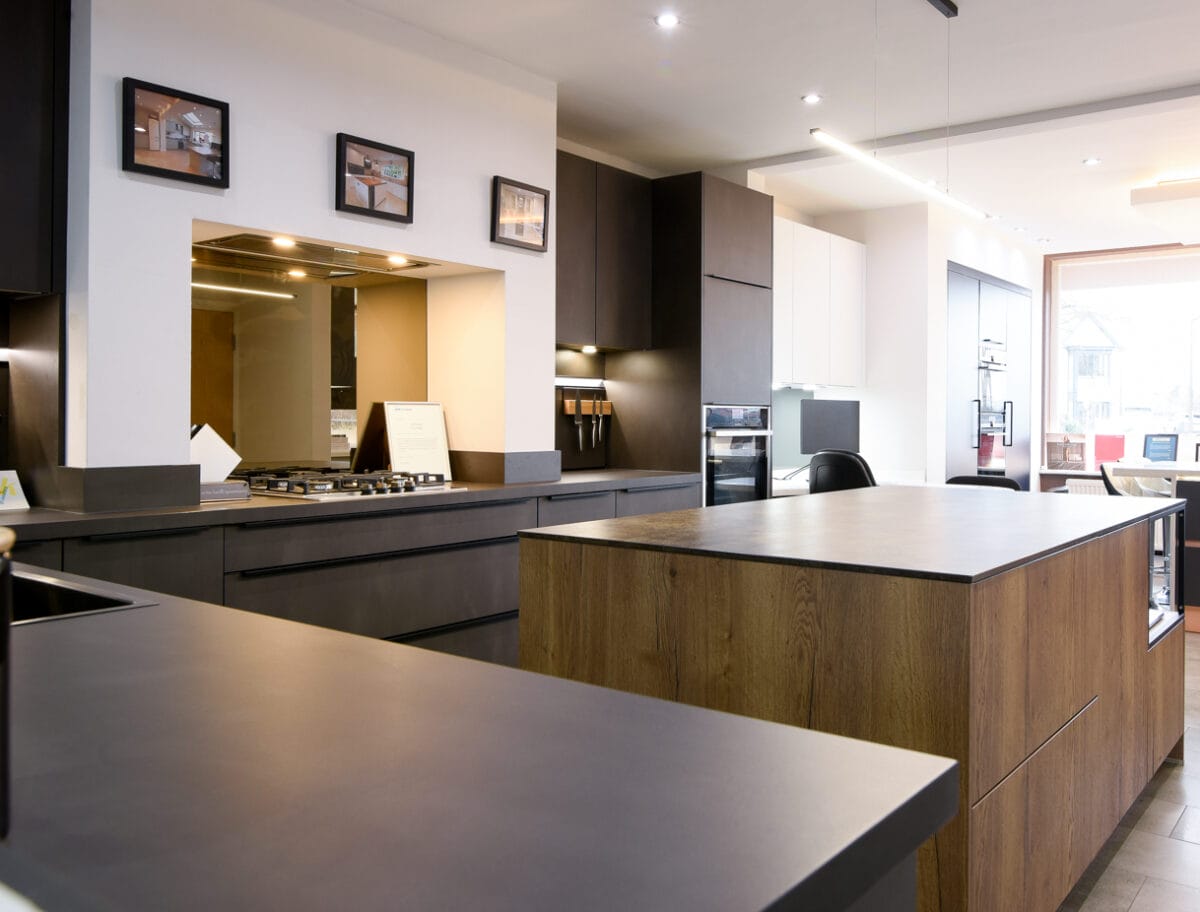
Which Kitchen Worktop Is The Best?
Quartz and Dekton are arguably two of the most durable and low-maintenance work surfaces available. However, if you’re looking for natural beauty or a seamless finish, timber, granite, and solid surface worktops make an excellent choice. Alternatively, wood and laminate are great options for the more budget-conscious. Ultimately, the best worktop depends on your individual brief. If you would like help choosing, please don’t hesitate to get in touch with our expert team. You can call us on 01942 815953 or email sales@ad3design.co.uk.

